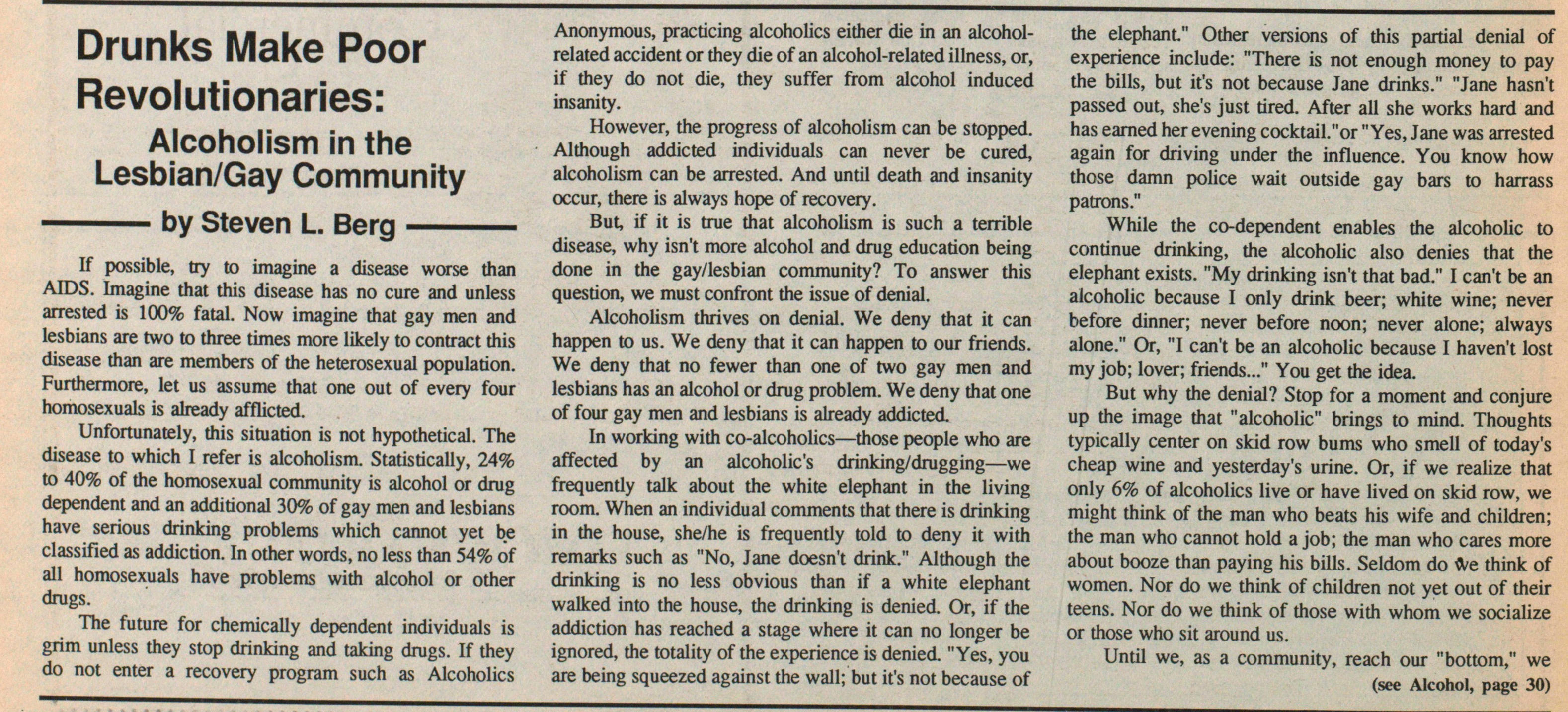Drunks Make Poor Revolutionaries

DRUNKS MAKE POOR REVOLUTIONARIES: Alcoholism in the Lesbian/Gay Community
by Steven L. Berg
If possible, try to imagine a disease worse than AIDS. Imagine that this disease has no cure and unless arrested is 100% fatal. Now imagine that gay men and lesbians are two to three times more likely to contract this disease than are members of the heterosexual population. Furthermore, let us assume that one out of every four homosexuals is already afflicted.
Unfortunately, this situation is not hypothetical. The disease to which I refer is alcoholism. Statistically, 24% to 40% of the homosexual community is alcohol or drug dependent and an additional 30% of gay men and lesbians have serious drinking problems which cannot yet be classified as addiction. In other words, no less than 54% of all homosexuals have problems with alcohol or other drugs.
The future for chemically dependent individuals is grim unless they stop drinking and taking drugs. If they do not enter a recovery program such as Alcoholics Anonymous, practicing alcoholics either die in an alcohol-related accident or they die of an alcohol-related illness, or, if they do not die, they suffer from alcohol induced insanity.
However, the progress of alcoholism can be stopped. Although addicted individuals can never be cured, alcoholism can be arrested. And until death and insanity occur, there is always hope of recovery.
But, if it is true that alcoholism is such a terrible disease, why isn't more alcohol and drug education being done in the gay/lesbian community? To answer this question, we must confront the issue of denial.
Alcoholism thrives on denial. We deny that it can happen to us. We deny that it can happen to our friends. We deny that no fewer than one of two gay men and lesbians has an alcohol or drug problem. We deny that one of four gay men and lesbians is already addicted.
In working with co-alcoholics - those people who are affected by an alcoholic's drinking/drugging - we frequently talk about the white elephant in the living room. When an individual comments that there is drinking in the house, she/he is frequently told to deny it with remarks such as "No, Jane doesn't drink." Although the drinking is no less obvious than if a white elephant walked into the house, the drinking is denied. Or, if the addiction has reached a stage where it can no longer be ignored, the totality of the experience is denied. "Yes, you are being squeezed against the wall; but it's not because of the elephant." Other versions of this partial denial of experience include: "There is not enough money to pay the bills, but it's not because Jane drinks." "Jane hasn't passed out, she's just tired. After all she works hard and has earned her evening cocktail."or "Yes, Jane was arrested again for driving under the influence. You know how those damn police wait outside gay bars to harrass patrons."
While the co-dependent enables the alcoholic to continue drinking, the alcoholic also denies that the elephant exists. "My drinking isn't that bad." I can't be an alcoholic because I only drink beer; white wine; never before dinner; never before noon; never alone; always alone." Or, "I can't be an alcoholic because I haven't lost my job; lover; friends..." You get the idea.
But why the denial? Stop for a moment and conjure up the image that "alcoholic" brings to mind. Thoughts typically center on skid row bums who smell of today's cheap wine and yesterday's urine. Or, if we realize that only 6% of alcoholics live or have lived on skid row, we might think of the man who beats his wife and children; the man who cannot hold a job; the man who cares more about booze than pay ing his bills. Seldom do we think of women. Nor do we think of children not yet out of their teens. Nor do we think of those with whom we socialize or those who sit around us.
Until we, as a community, reach our "bottom," we (see Alcohol, page 30)